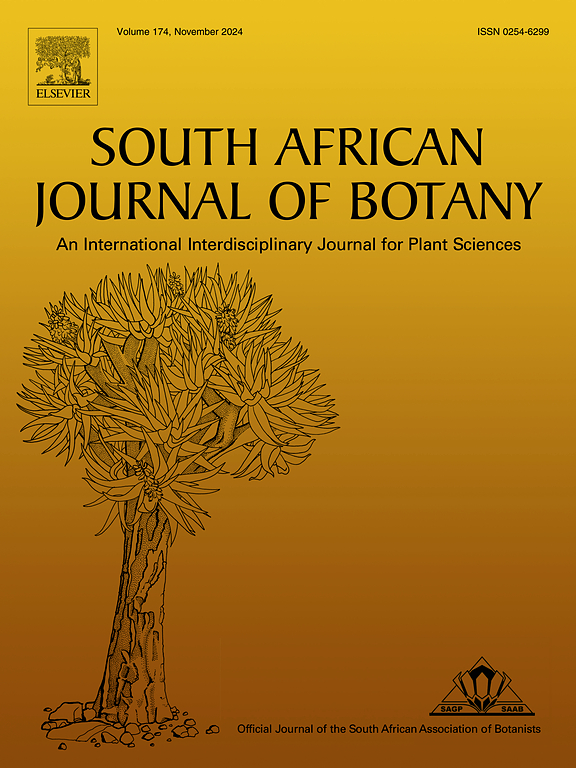Inducing mutations with EMS are useful in breaking the established correlations among economically important traits in cotton
IF 2.7
3区 生物学
Q2 PLANT SCIENCES
引用次数: 0
Abstract
Expanding the extent of genetic diversity, eroded during the process of domestication and breeding efforts, is essentially required for developing climate resilient cultivars as well as for pinning down the genetic pathways of complex traits. A total of 224 mutants were developed by exposing seed of a candidate cotton variety ‘PGMB-2467ʼ with an optimized concentration of ethyl methanesulfonate (EMS). These mutant lines along with the wild type were phenotypically characterized by sowing trials at two sites using alpha lattice design for three successive generations, M4, M5 and M6. The variations observed in the studied traits at both extremes as compared to the wild type were largely due to genetics as was confirmed by their stable expression as well as their heritability (H2) estimates. Correlations between the traits as reported in early studies remained intact which was possibly due to the mutations induced in genes with pleiotropic effect. However, positive correlation between fiber strength (FS) and micronaire (MIC) value, contradictory to several studies, was possibly due to mutations induced in gene(s) conferring either of the traits of mutant population or genetic background of the wildtype. Principal component analysis (PCA) elucidated that first five components explained 61.2 % and 59 % of total variations at Nuclear Institute for Agriculture and Biology (NIAB) and National Institute for Biotechnology and Genetic Engineering (NIBGE) location, respectively. The genotype by trait (GT) bi-plot revealed significant associations between plant height (PH), ginning out turn percentage (GOT%) and fiber quality traits. Mutant lines PGMB-139 and PGMB-140 exhibited maximum GOT% and MIC value. Also, PGMB-143 and PGMB-48 were found to be the best mutant lines for fiber strength (FS), PGMB-463 for upper half mean length (UHML) and PGMB-62-1 for PH. It was concluded that EMS can be used as an alternative to physical mutagens and recombinational breeding for inducing mutations in the genome. These newly developed mutants can be used by the international cotton community for exploring their potential in improving cotton cultivars, hybrid vigor and also for unravelling the genetic mechanisms of the studied traits which would lead to initiate breeding by design.
利用 EMS 诱导突变有助于打破棉花重要经济性状之间的既定相关性
扩大在驯化和育种过程中被侵蚀的遗传多样性是开发气候适应性强的栽培品种以及确定复杂性状遗传途径的基本要求。通过将候选棉花品种 "PGMB-2467 "的种子暴露于优化浓度的甲基磺酸乙酯(EMS)中,共培育出 224 个突变体。这些突变株系与野生型一起,通过在两个地点连续三代(M4、M5 和 M6)进行α-点阵设计的播种试验进行表型鉴定。与野生型相比,在两个极端观察到的所研究性状的变化在很大程度上是由遗传引起的,其稳定表达和遗传率(H2)估计值也证实了这一点。早期研究中报告的性状之间的相关性保持不变,这可能是由于诱导基因突变产生了多效应。然而,纤维强度(FS)和微米值(MIC)之间的正相关性与多项研究相矛盾,这可能是由于突变群体或野生型遗传背景的基因突变赋予了这两个性状。主成分分析(PCA)表明,核农业与生物研究所(NIAB)和国家生物技术与遗传工程研究所(NIBGE)的前五个成分分别解释了61.2%和59%的总变异。基因型-性状(GT)双图显示,植株高度(PH)、轧棉出车率(GOT%)和纤维质量性状之间存在显著关联。突变品系 PGMB-139 和 PGMB-140 的 GOT% 和 MIC 值最大。此外,还发现 PGMB-143 和 PGMB-48 是纤维强度(FS)最好的突变株,PGMB-463 是上半部平均长度(UHML)最好的突变株,PGMB-62-1 是 PH 最好的突变株。结论是,EMS 可替代物理诱变剂和重组育种来诱导基因组突变。国际棉花界可利用这些新开发的突变体,探索其在改良棉花栽培品种、提高杂交活力方面的潜力,同时也可用于揭示所研究性状的遗传机制,从而启动设计育种。
本文章由计算机程序翻译,如有差异,请以英文原文为准。
求助全文
约1分钟内获得全文
求助全文
来源期刊

South African Journal of Botany
生物-植物科学
CiteScore
5.20
自引率
9.70%
发文量
709
审稿时长
61 days
期刊介绍:
The South African Journal of Botany publishes original papers that deal with the classification, biodiversity, morphology, physiology, molecular biology, ecology, biotechnology, ethnobotany and other botanically related aspects of species that are of importance to southern Africa. Manuscripts dealing with significant new findings on other species of the world and general botanical principles will also be considered and are encouraged.
 求助内容:
求助内容: 应助结果提醒方式:
应助结果提醒方式:


